History's Craziest Mystical Rebels Who May Have Been On To Something
Nathan Johnson
Published
10/10/2016
in
wtf
history was a weird place
- List View
- Player View
- Grid View
Advertisement
-
1.
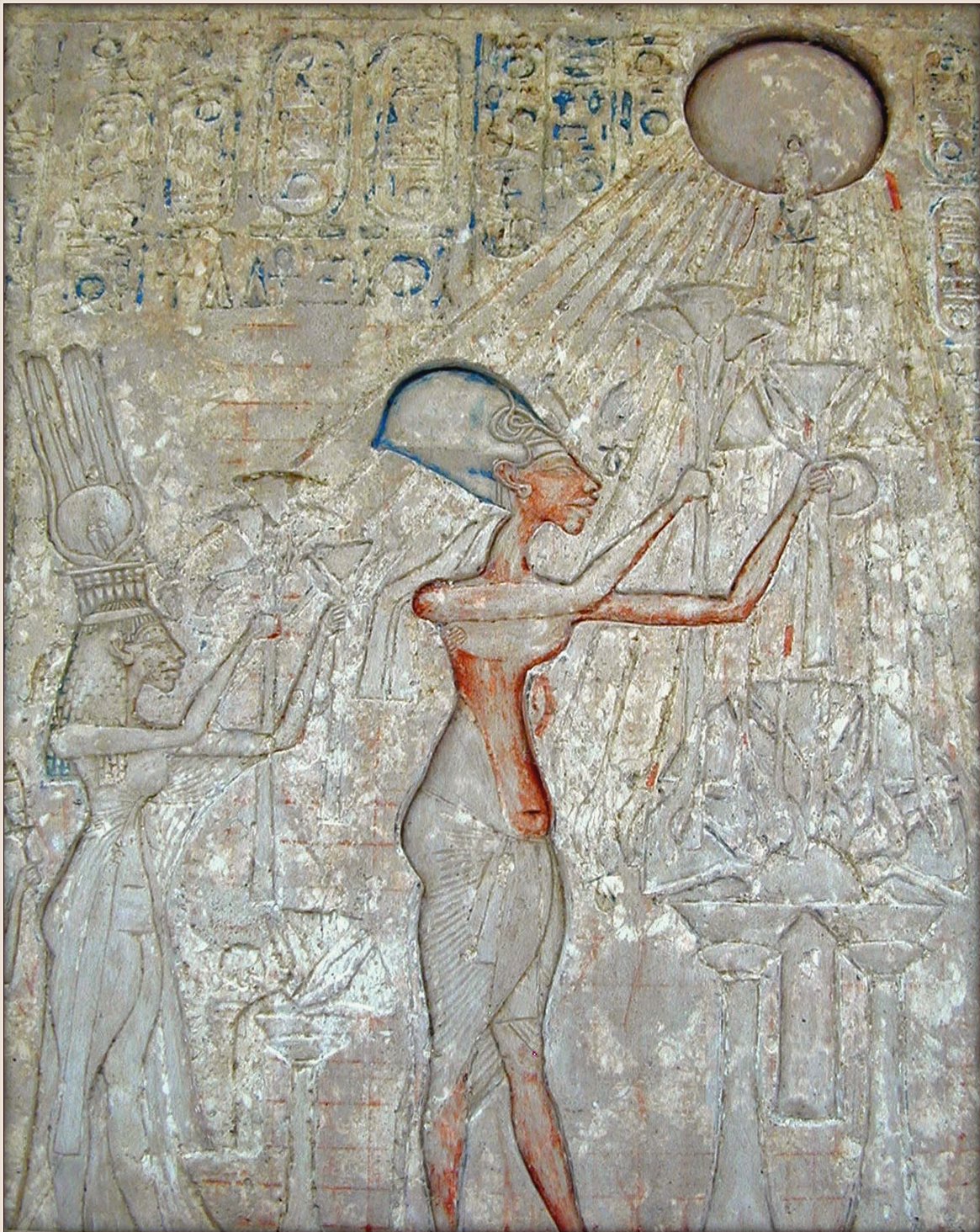 The great-granddaddy of all 'mystical rebels' was the Pharaoh Akhenaten. He was ruler of all Egypt in the 14th century BC. Why was he a rebel? He was the first guy in known history to claim that there was only one God. For Akhenaten, it was the Sun, which he called the Aten. And it wasn't even a god with a body (not even the animal-headed bodies the Egyptians liked); it was just "the sun". He shut down every other temple in Egypt, and during the couple of decades of his rule, Egypt was the first monotheistic state. What happened to him? His ideas were too radical for the Egyptian people, and highly unpopular. He was untouchable while he was alive, but as soon as he died all his reforms were reversed. Akhenaten's spiritual vision was wiped away. Or maybe not. Some archaeologists have noticed some similarities between the Aten religion and Judaism, which would appear a while later. In one very telling piece of evidence, Akhenaten's "Great Hymn To the Aten" bears a striking similarity to Psalm 104, which is recited daily by observant Jews. Some unorthodox historians think Judaism may have been influenced (or even descended from) faithful adherents of the Aten that were forced out of Egypt.
The great-granddaddy of all 'mystical rebels' was the Pharaoh Akhenaten. He was ruler of all Egypt in the 14th century BC. Why was he a rebel? He was the first guy in known history to claim that there was only one God. For Akhenaten, it was the Sun, which he called the Aten. And it wasn't even a god with a body (not even the animal-headed bodies the Egyptians liked); it was just "the sun". He shut down every other temple in Egypt, and during the couple of decades of his rule, Egypt was the first monotheistic state. What happened to him? His ideas were too radical for the Egyptian people, and highly unpopular. He was untouchable while he was alive, but as soon as he died all his reforms were reversed. Akhenaten's spiritual vision was wiped away. Or maybe not. Some archaeologists have noticed some similarities between the Aten religion and Judaism, which would appear a while later. In one very telling piece of evidence, Akhenaten's "Great Hymn To the Aten" bears a striking similarity to Psalm 104, which is recited daily by observant Jews. Some unorthodox historians think Judaism may have been influenced (or even descended from) faithful adherents of the Aten that were forced out of Egypt. -
2.
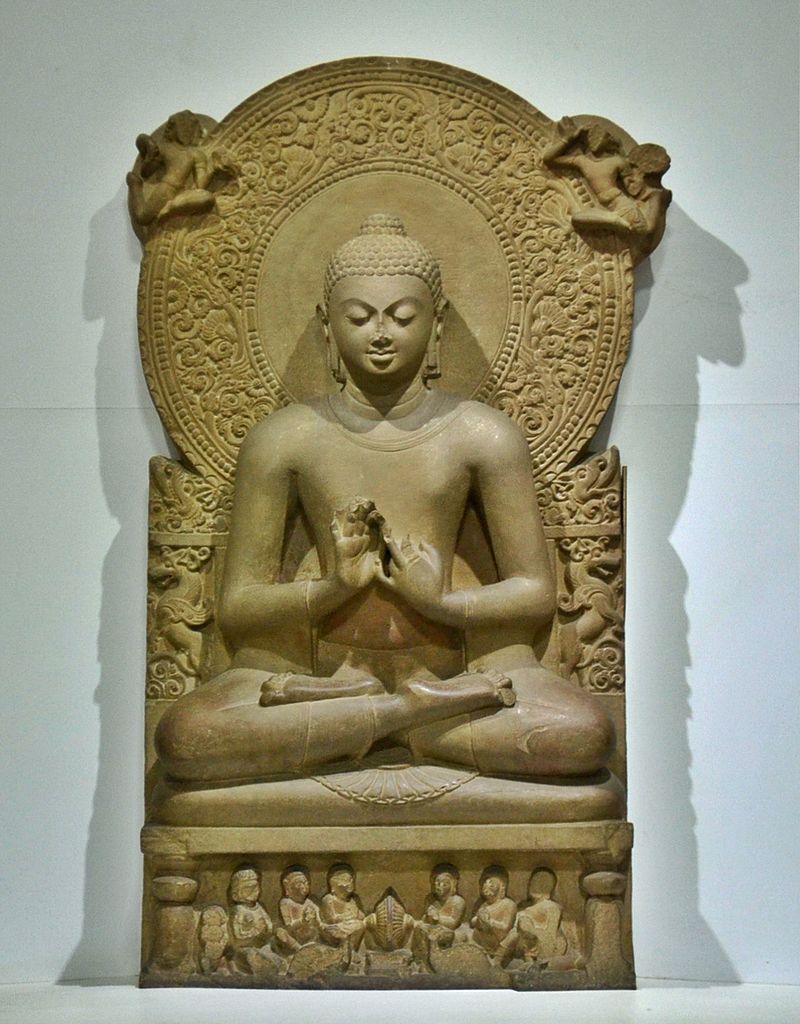 In the 5th Century BC, the Buddha turned India (and later the world) on its head. He founded one of the great world religions, and taught ideas no one had even conceived of before he came along. Why was he a rebel? If you imagine the Buddha today, you probably think of the exact opposite of a rebel. You imagine this peaceful guy meditating under a tree, all calm and placid. Forget all that, it's bull. To his own civilization, the Buddha must have looked like the freaking Anti-Christ. He pissed people off so badly that not only did they want to kill him several times in his life, but they also engaged in lengthy fights with his followers for a long time after he was dead. You have to understand the context: in the Brahmin Indian society he was born into, the Buddha taught that instead of there being a whole bunch of Gods connected to a super-soul (Brahma), there were actually no gods and there was no soul. Instead of the promise of some kind of paradise and immortal union with the Godhead like the Brahmins taught, he said that was all a delusion and that actually the best thing you could hope for is to cease to exist, to return to nothing. Yes, he taught reincarnation, but from his view reincarnation was just a trap; rich or poor, everyone was doomed to suffer and feel unsatisfied by their existence and their unfulfilled desires, over and over again. Oh, and the caste system that was the foundation of the whole society? That was just a total lie and a meaningless trap to keep people obedient. The dude was literally defying the most basic tenets of his entire culture; teaching that everything they thought was true was a lie, and everything they thought was good actually sucked. What happened to him? The Buddha managed to live a long life, in spite of assassination attempts, and gathered a large following of students. He finally died from food poisoning from a bad pork dumpling (yes, the Buddha ate meat, he actually forbade vegetarianism!). Almost as soon as he died, his teachings split into something like 20 different sects that all disagreed about what he really meant. He had personally warned his students not to de-evolve into blind faith; and said that because he would keep being misinterpreted, his teachings wouldn't be any use at all after a few hundred years. It's now been 2500 years, and there are still "Buddhists" around. Guess they didn't listen. Oh, and today Buddha is mostly doomed to have idiots posting 'quotes' of stuff he never actually said, on Facebook.
In the 5th Century BC, the Buddha turned India (and later the world) on its head. He founded one of the great world religions, and taught ideas no one had even conceived of before he came along. Why was he a rebel? If you imagine the Buddha today, you probably think of the exact opposite of a rebel. You imagine this peaceful guy meditating under a tree, all calm and placid. Forget all that, it's bull. To his own civilization, the Buddha must have looked like the freaking Anti-Christ. He pissed people off so badly that not only did they want to kill him several times in his life, but they also engaged in lengthy fights with his followers for a long time after he was dead. You have to understand the context: in the Brahmin Indian society he was born into, the Buddha taught that instead of there being a whole bunch of Gods connected to a super-soul (Brahma), there were actually no gods and there was no soul. Instead of the promise of some kind of paradise and immortal union with the Godhead like the Brahmins taught, he said that was all a delusion and that actually the best thing you could hope for is to cease to exist, to return to nothing. Yes, he taught reincarnation, but from his view reincarnation was just a trap; rich or poor, everyone was doomed to suffer and feel unsatisfied by their existence and their unfulfilled desires, over and over again. Oh, and the caste system that was the foundation of the whole society? That was just a total lie and a meaningless trap to keep people obedient. The dude was literally defying the most basic tenets of his entire culture; teaching that everything they thought was true was a lie, and everything they thought was good actually sucked. What happened to him? The Buddha managed to live a long life, in spite of assassination attempts, and gathered a large following of students. He finally died from food poisoning from a bad pork dumpling (yes, the Buddha ate meat, he actually forbade vegetarianism!). Almost as soon as he died, his teachings split into something like 20 different sects that all disagreed about what he really meant. He had personally warned his students not to de-evolve into blind faith; and said that because he would keep being misinterpreted, his teachings wouldn't be any use at all after a few hundred years. It's now been 2500 years, and there are still "Buddhists" around. Guess they didn't listen. Oh, and today Buddha is mostly doomed to have idiots posting 'quotes' of stuff he never actually said, on Facebook. -
3.
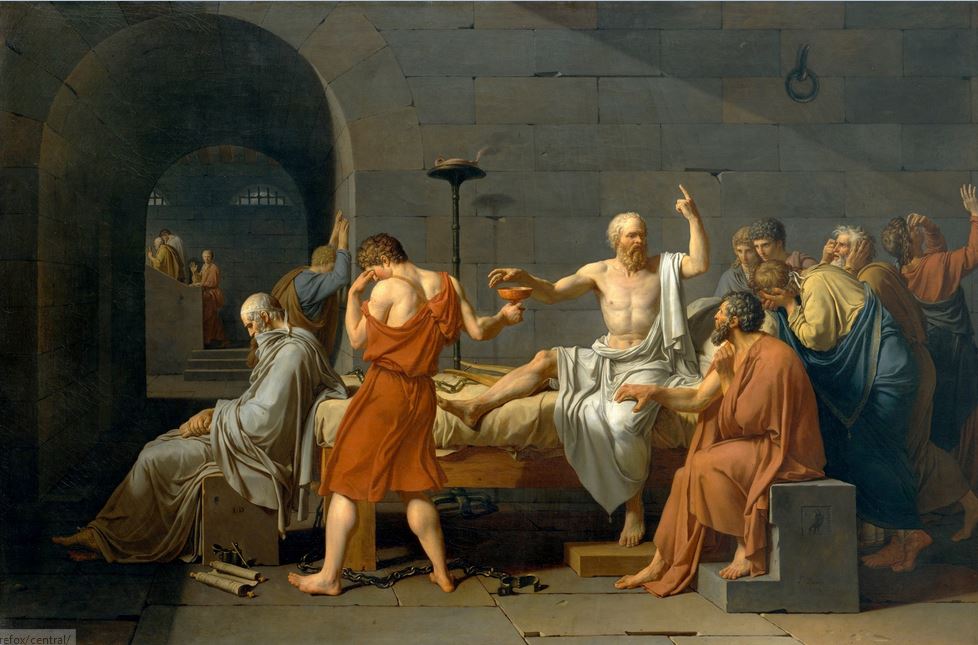 In the 5th Century BC, Socrates pushed philosophy up to a whole new level. He would end up inspiring Plato, Aristotle and through them pretty much every western philosopher ever since. Why was he a rebel? Socrates was dedicated to truth with an absolute ferocity. He was willing to risk everything rather than compromise with what was true. Maybe two of the most important things he taught was that wisdom came more from realizing (and admitting!) how little you know, than from clinging to what you think you do know, and that the way to get to truth is by a process of questioning everything. This process of getting to the truth through the process of questioning came to be known as the 'Socratic method', and when Socrates wasn't busy getting drunk or getting it on with teenage boys, he was apparently spending most of the rest of his time using this method to hugely piss off the important people of his native Athens. His inconvenient questions made them reveal themselves to be idiots, and they hated him for it. What happened to him? He was eventually put on trial, on the charge of corrupting the youth of Athens (with dangerous ideas; nobody cared much about the pederasty) and not believing in the city's gods (both of which were probably true). He was sentenced to die by drinking poison (hemlock). A true philosopher to the end, he carefully examined the effects of the poison on his body. He came to conclude that the soul existed and was immortal, and that death was the 'cure' to life, and the final freedom.
In the 5th Century BC, Socrates pushed philosophy up to a whole new level. He would end up inspiring Plato, Aristotle and through them pretty much every western philosopher ever since. Why was he a rebel? Socrates was dedicated to truth with an absolute ferocity. He was willing to risk everything rather than compromise with what was true. Maybe two of the most important things he taught was that wisdom came more from realizing (and admitting!) how little you know, than from clinging to what you think you do know, and that the way to get to truth is by a process of questioning everything. This process of getting to the truth through the process of questioning came to be known as the 'Socratic method', and when Socrates wasn't busy getting drunk or getting it on with teenage boys, he was apparently spending most of the rest of his time using this method to hugely piss off the important people of his native Athens. His inconvenient questions made them reveal themselves to be idiots, and they hated him for it. What happened to him? He was eventually put on trial, on the charge of corrupting the youth of Athens (with dangerous ideas; nobody cared much about the pederasty) and not believing in the city's gods (both of which were probably true). He was sentenced to die by drinking poison (hemlock). A true philosopher to the end, he carefully examined the effects of the poison on his body. He came to conclude that the soul existed and was immortal, and that death was the 'cure' to life, and the final freedom. -
4.
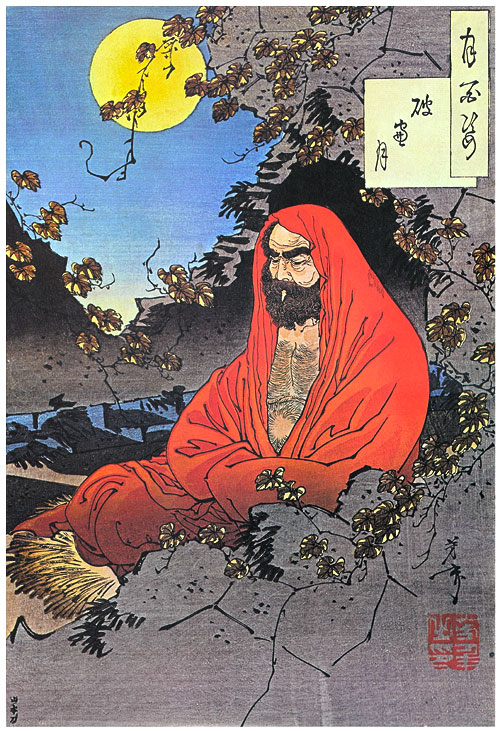 There were actually lots of Buddhist masters over the years that were crazy and wild (including, as already mentioned, the Buddha himself) but most of them were whitewashed over the centuries into these placid soulless kind of caricatures. But Bodhidharma was so totally nuts that even the last 1500 years of Buddhist orthodoxy couldn't do that to him. Alive in the 6th century, Bodhidharma was the guy who invented what would eventually become Zen Buddhism. There were Buddhists in China before him, but he was largely the one responsible for making Buddhism popular in China. Why was he a rebel? The Chinese texts called him "the blue-eyed barbarian"; even the texts that were favorable to him! He had a crazy beard, and a foul temper. He came to China from India, because (he claimed) there wasn't anyone in all of India capable of being his student. The story goes that an Emperor who was favorable to Buddhism came to see him, and told him about the monasteries he'd paid for, asking Bodhidharma what benefits it brought him; Bodhidharma told him it was of no benefit at all. He traveled through China but couldn't find anyone worthy of learning the truth from him; so finally he went into a cave and stared at a wall for nine years. At one point (legend has it), when he got tired and fell asleep while meditating, he tore off his own eyelids in anger (the legend also claims that the first tea plants grew from his eyelids, so take that story with a grain of salt). Finally, a student called Huike came to ask for Bodhidharma's teaching; when Bodhidharma ignored him, Huike cut off his own arm and said "if you don't agree to teach me, I'll cut my own head off next!". Bodhidharma turned from the wall, saying "at last I have found a worthy student!" Oh yeah, and after this, Bodhidharma went to a temple, took it over, and whipped the monks there into shape by inventing Shaolin Kung Fu. What happened to him? He's still widely venerated as a great Buddhist teacher. Of course, most of what I mentioned above is probably legend. His original teachings were split up and descended into a ton of different sects and systems, including Japanese Zen. Still, for a spiritual rebel, he did pretty good. We also might not have all those awesome Kung-fu movies if it hadn't been for him.
There were actually lots of Buddhist masters over the years that were crazy and wild (including, as already mentioned, the Buddha himself) but most of them were whitewashed over the centuries into these placid soulless kind of caricatures. But Bodhidharma was so totally nuts that even the last 1500 years of Buddhist orthodoxy couldn't do that to him. Alive in the 6th century, Bodhidharma was the guy who invented what would eventually become Zen Buddhism. There were Buddhists in China before him, but he was largely the one responsible for making Buddhism popular in China. Why was he a rebel? The Chinese texts called him "the blue-eyed barbarian"; even the texts that were favorable to him! He had a crazy beard, and a foul temper. He came to China from India, because (he claimed) there wasn't anyone in all of India capable of being his student. The story goes that an Emperor who was favorable to Buddhism came to see him, and told him about the monasteries he'd paid for, asking Bodhidharma what benefits it brought him; Bodhidharma told him it was of no benefit at all. He traveled through China but couldn't find anyone worthy of learning the truth from him; so finally he went into a cave and stared at a wall for nine years. At one point (legend has it), when he got tired and fell asleep while meditating, he tore off his own eyelids in anger (the legend also claims that the first tea plants grew from his eyelids, so take that story with a grain of salt). Finally, a student called Huike came to ask for Bodhidharma's teaching; when Bodhidharma ignored him, Huike cut off his own arm and said "if you don't agree to teach me, I'll cut my own head off next!". Bodhidharma turned from the wall, saying "at last I have found a worthy student!" Oh yeah, and after this, Bodhidharma went to a temple, took it over, and whipped the monks there into shape by inventing Shaolin Kung Fu. What happened to him? He's still widely venerated as a great Buddhist teacher. Of course, most of what I mentioned above is probably legend. His original teachings were split up and descended into a ton of different sects and systems, including Japanese Zen. Still, for a spiritual rebel, he did pretty good. We also might not have all those awesome Kung-fu movies if it hadn't been for him. -
5.
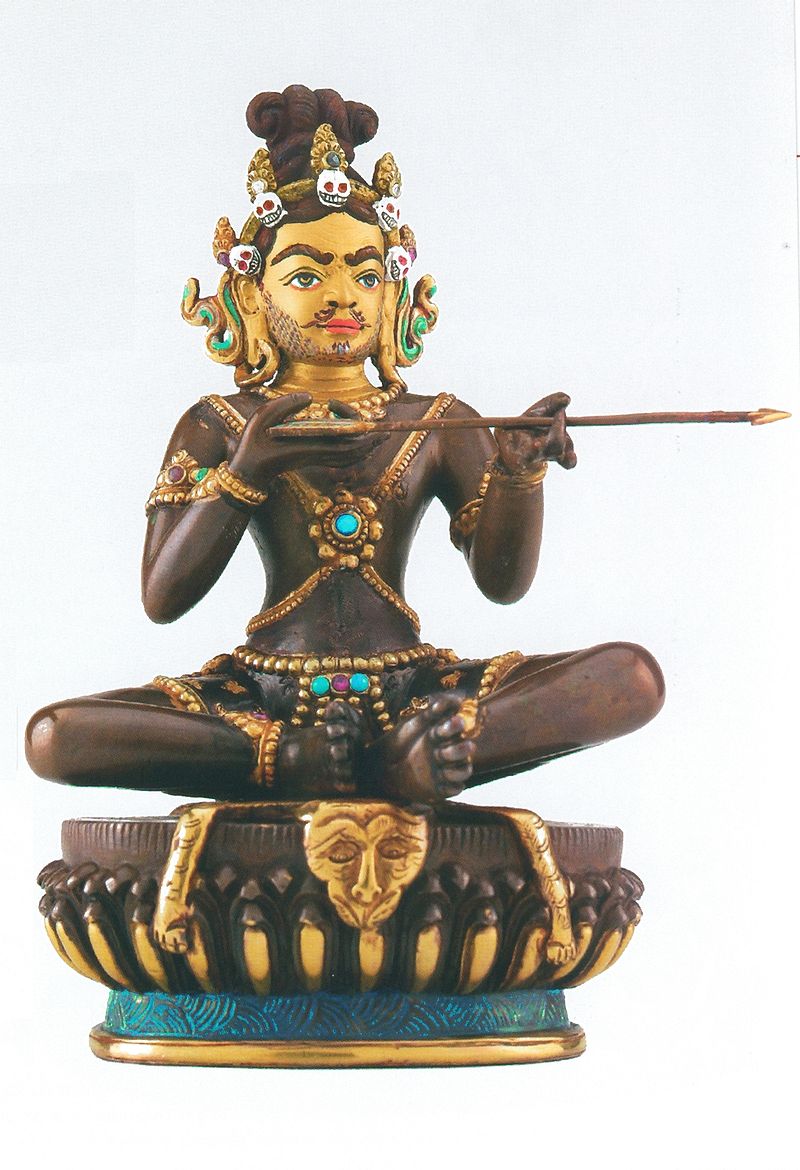 Saraha was a very unorthodox 8th Century Himalayan master, and one of the founders of Tibetan Tantra, long before it went all mainstream and became the property of boring monks. In the west we think of "tantra" as something like sacred-sex, but it was actually a whole set of secret techniques (with both Hindu and Buddhist variations) that were meant to achieve Enlightenment by interacting with the world (rather than trying to move away from it) and by confronting desires and taboos by engaging with them. Why was he a rebel? Well, first there was the whole 'tantra' thing. Pretty much every early tantric master was a huge rebel: they would face things like sex, death, forbidden food and drink, hanging out in graveyards, consorting with prostitutes, confronting demons, all the stuff polite society said wasn't allowed. And they did it to break free of the limitations of their own ego. But Saraha was also extra-rebellious in that he broke some of the biggest taboos around caste and gender. His two most important teachers were both women, and women of a lower-caste than he was (being born into a very high Brahmin caste). His most important teacher was a woman who made arrows (a low-class job at the time), and he became her apprentice (which was shocking). She taught him the secrets of concentration by showing him the art of arrow making and archery. The two ended up living together in a cremation ground (an unclean place where dead bodies were burned), and she taught him secret tantric methods. His second teacher was a low-born woman who cooked radish curry. When Saraha had been meditating for a very long time, he was snapped out of it by the smell of the curry, and asked for some; she said to him "you've been meditating for 12 years, and all you can think about is radish curry"? He became distressed, and decided to go away to the mountains, realizing that she was right about how useless his meditation had been, but again she chided him: "what good will going away to the mountains do for you? It's not the curry you have to escape from, it's your notions". When he realized this was also true, he changed his whole method, learning (and later teaching) that real meditation could not be gained by trying to reject stuff, but by changing the whole way you interact with life. Going to the mountains was pointless, you have to experience the connection to pure consciousness with whatever you're doing, wherever you are. What happened to him? Saraha started a tradition that was hugely important and very dynamic for several hundred years. Eventually, his teaching was persecuted in Hindu India, and in Buddhist Tibet it was taken over by a system of monks (the Dalai Lama and company), who made it all a lot more boring and less useful.
Saraha was a very unorthodox 8th Century Himalayan master, and one of the founders of Tibetan Tantra, long before it went all mainstream and became the property of boring monks. In the west we think of "tantra" as something like sacred-sex, but it was actually a whole set of secret techniques (with both Hindu and Buddhist variations) that were meant to achieve Enlightenment by interacting with the world (rather than trying to move away from it) and by confronting desires and taboos by engaging with them. Why was he a rebel? Well, first there was the whole 'tantra' thing. Pretty much every early tantric master was a huge rebel: they would face things like sex, death, forbidden food and drink, hanging out in graveyards, consorting with prostitutes, confronting demons, all the stuff polite society said wasn't allowed. And they did it to break free of the limitations of their own ego. But Saraha was also extra-rebellious in that he broke some of the biggest taboos around caste and gender. His two most important teachers were both women, and women of a lower-caste than he was (being born into a very high Brahmin caste). His most important teacher was a woman who made arrows (a low-class job at the time), and he became her apprentice (which was shocking). She taught him the secrets of concentration by showing him the art of arrow making and archery. The two ended up living together in a cremation ground (an unclean place where dead bodies were burned), and she taught him secret tantric methods. His second teacher was a low-born woman who cooked radish curry. When Saraha had been meditating for a very long time, he was snapped out of it by the smell of the curry, and asked for some; she said to him "you've been meditating for 12 years, and all you can think about is radish curry"? He became distressed, and decided to go away to the mountains, realizing that she was right about how useless his meditation had been, but again she chided him: "what good will going away to the mountains do for you? It's not the curry you have to escape from, it's your notions". When he realized this was also true, he changed his whole method, learning (and later teaching) that real meditation could not be gained by trying to reject stuff, but by changing the whole way you interact with life. Going to the mountains was pointless, you have to experience the connection to pure consciousness with whatever you're doing, wherever you are. What happened to him? Saraha started a tradition that was hugely important and very dynamic for several hundred years. Eventually, his teaching was persecuted in Hindu India, and in Buddhist Tibet it was taken over by a system of monks (the Dalai Lama and company), who made it all a lot more boring and less useful. -
6.
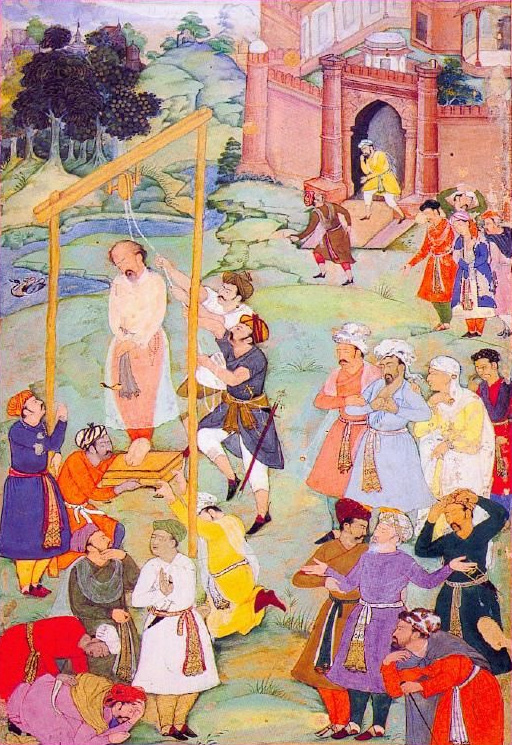 In the Muslim world, the spiritual rebels were the esoteric mystics known as the Sufis. They were as old as Islam itself (some Sufis say they were older, in fact), and interpreted the Islamic teaching in a totally different way than the very literalist and fundamentalist way we see groups like ISIS doing it now. For the Sufis, the teachings of Islam were full of symbolism and allegory, they had secret groups that gave initiations, and taught techniques of meditation to obtain oneness with Allah. One of the great spiritual rebels of Sufism was Mansur Al-Hallaj, the 10th Century mystic who gave his life in consequence of his unshakable fidelity to the spiritual truths of Sufism. Why was he a rebel? Al-Hallaj was rebellious even by Sufi standards. Most Sufis kept their teachings highly secret, realizing that the mainstream Muslim society would neither understand, nor accept, nor likely benefit from them. But Al-Hallaj rebelled against this. After spending a year in Mecca in complete silence and fasting, he threw away his Sufi robes, and decided he had to share Truth with everyone, whatever the cost. He traveled across much of the Muslim world, becoming quite famous, and being accused of blasphemy, sorcery, and consorting with genies all along the way. What happened to him? When he got to Baghdad, Al-Hallaj became known for proclaiming "I am the Truth" (a major mystical statement, but something that the common people interpreted as blasphemy), and "under my cloak there is nothing but God" (ditto). Eventually the authorities had enough; they imprisoned him, and then executed Al-Hallaj by first beating him, then lashing him, and finally decapitating him. His last words were "all that matters to the mystic is that the Only break him down into Unity".
In the Muslim world, the spiritual rebels were the esoteric mystics known as the Sufis. They were as old as Islam itself (some Sufis say they were older, in fact), and interpreted the Islamic teaching in a totally different way than the very literalist and fundamentalist way we see groups like ISIS doing it now. For the Sufis, the teachings of Islam were full of symbolism and allegory, they had secret groups that gave initiations, and taught techniques of meditation to obtain oneness with Allah. One of the great spiritual rebels of Sufism was Mansur Al-Hallaj, the 10th Century mystic who gave his life in consequence of his unshakable fidelity to the spiritual truths of Sufism. Why was he a rebel? Al-Hallaj was rebellious even by Sufi standards. Most Sufis kept their teachings highly secret, realizing that the mainstream Muslim society would neither understand, nor accept, nor likely benefit from them. But Al-Hallaj rebelled against this. After spending a year in Mecca in complete silence and fasting, he threw away his Sufi robes, and decided he had to share Truth with everyone, whatever the cost. He traveled across much of the Muslim world, becoming quite famous, and being accused of blasphemy, sorcery, and consorting with genies all along the way. What happened to him? When he got to Baghdad, Al-Hallaj became known for proclaiming "I am the Truth" (a major mystical statement, but something that the common people interpreted as blasphemy), and "under my cloak there is nothing but God" (ditto). Eventually the authorities had enough; they imprisoned him, and then executed Al-Hallaj by first beating him, then lashing him, and finally decapitating him. His last words were "all that matters to the mystic is that the Only break him down into Unity". -
7.
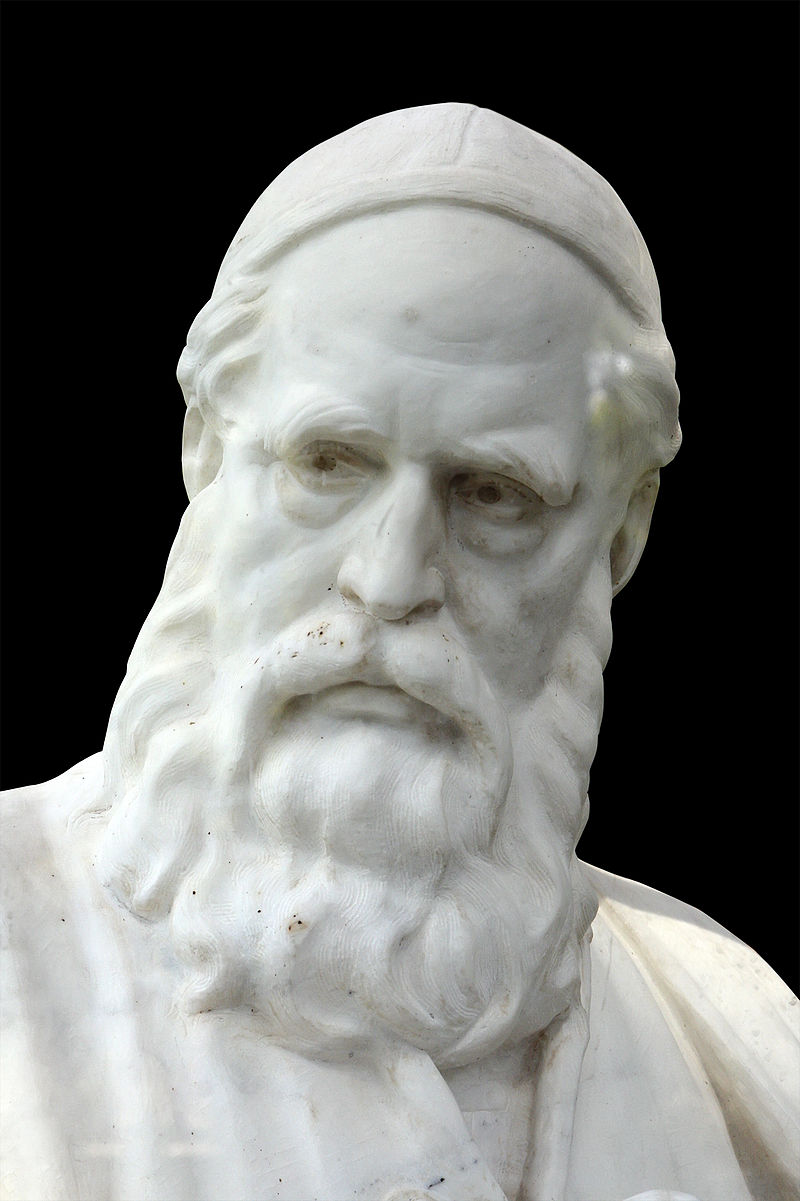 Khayyam was a 12th Century Persian Sufi mystic. He was also a scholar, and an expert on mathematics, who established writings on algebra that would later be adopted in Europe. He was a friend in his youth of Hassan I-Sabbah (the future leader of the Assassins); and in his later years of the great Sufi theologian Al-Ghazali (who unlike Khayyam was considered a respected mainstream non-rebel teacher). He was an astronomer (and astrologer), and like Pythagoras before him, he promoted a heliocentric theory of the solar system. In his studies of the sciences, he was something of a rebel. But his most rebellious element was in his stunning poetry. Why was he a rebel? These days, Rumi is more popular in the west; but to me, Rumi doesn't hold a candle to Omar Khayyam. Khayyam's poems were sometimes interpreted, both by his Muslim contemporaries and modern Western scholars, as being 'atheistic' (which didn't win him any favors in his own lifetime), but in fact, they are full of Sufi teaching. They appear to present a bleak view of a mostly meaningless incomprehensible world, advising the read to 'drink wine' and seek 'a lover', making him seem like a libertine, though in fact these were code-words of the Sufis for states of meditation and mystical union. He wrote: "You are not just given Truth or Certainty, And you can't just sit in dubious faith your whole life long. Be careful not to set aside the cup of Wine, Because the sober man is a fool, but the drunken man is a Fool." What happened to him? Though he was faced with serious problems a couple of times in his life because of his outrageous behavior and dangerous statements, he managed to avoid getting himself killed. Today, he's still loved by the Iranian people, but modern mainstream Islam has rejected him as a heretic at best, an atheistic unbeliever at worst. Also, while he was one of the first Sufi poets to be popularly translated in the west, the translation was a total butchery of his real poems.
Khayyam was a 12th Century Persian Sufi mystic. He was also a scholar, and an expert on mathematics, who established writings on algebra that would later be adopted in Europe. He was a friend in his youth of Hassan I-Sabbah (the future leader of the Assassins); and in his later years of the great Sufi theologian Al-Ghazali (who unlike Khayyam was considered a respected mainstream non-rebel teacher). He was an astronomer (and astrologer), and like Pythagoras before him, he promoted a heliocentric theory of the solar system. In his studies of the sciences, he was something of a rebel. But his most rebellious element was in his stunning poetry. Why was he a rebel? These days, Rumi is more popular in the west; but to me, Rumi doesn't hold a candle to Omar Khayyam. Khayyam's poems were sometimes interpreted, both by his Muslim contemporaries and modern Western scholars, as being 'atheistic' (which didn't win him any favors in his own lifetime), but in fact, they are full of Sufi teaching. They appear to present a bleak view of a mostly meaningless incomprehensible world, advising the read to 'drink wine' and seek 'a lover', making him seem like a libertine, though in fact these were code-words of the Sufis for states of meditation and mystical union. He wrote: "You are not just given Truth or Certainty, And you can't just sit in dubious faith your whole life long. Be careful not to set aside the cup of Wine, Because the sober man is a fool, but the drunken man is a Fool." What happened to him? Though he was faced with serious problems a couple of times in his life because of his outrageous behavior and dangerous statements, he managed to avoid getting himself killed. Today, he's still loved by the Iranian people, but modern mainstream Islam has rejected him as a heretic at best, an atheistic unbeliever at worst. Also, while he was one of the first Sufi poets to be popularly translated in the west, the translation was a total butchery of his real poems. -
8.
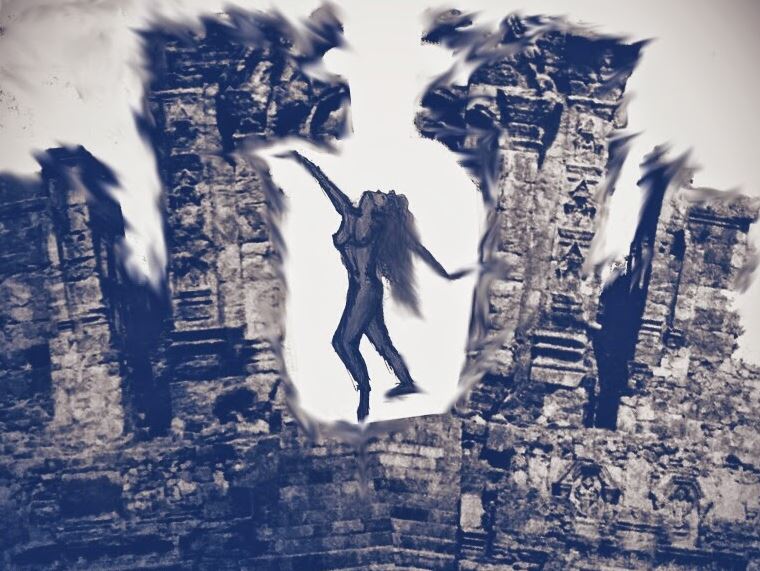 At long last, we get to a woman rebel. And she was quite the rebel! Laleshwari, also known as "Lal Ded" or just Lalla, was the greatest poetess of the Kashmir, in India. For much of the 14th Century, she both scandalized and amazed the people of that region. Why was she a rebel? Lalla started her life as the daughter of a high-caste family. When she was 12 she was married off, which led to many unhappy loveless years. When she turned 24 she couldn't stand it anymore, and ran away. She became a renunciate in a Hindu Tantric order. But that wasn't nearly rebellious enough for her. Pretty soon, she was also hanging out with Muslim Sufis. Unwilling to follow any rules of society or of religion, she eventually took to wandering, completely naked, through the Kashmir, reciting her mystical poetry (which was all about ecstatic rapture for a divinity that goes beyond all tribalism). In one of her poems, she said: "My teacher taught me only one thing: live in the soul. When I began to, I became naked, and danced". What happened to her? In spite of behaving in a way that would have been utterly shocking to the Kashmiri people, she was such an astounding and awe-inspiring figure, and so clearly 'saintly', that she came to be accepted and beloved of the locals. She lived a fairly long life and left a legacy as one of the great Kashmiri cultural heroes to this day. Even now, there's a local saying: "In Kashmir, there is only Allah and Lalla".
At long last, we get to a woman rebel. And she was quite the rebel! Laleshwari, also known as "Lal Ded" or just Lalla, was the greatest poetess of the Kashmir, in India. For much of the 14th Century, she both scandalized and amazed the people of that region. Why was she a rebel? Lalla started her life as the daughter of a high-caste family. When she was 12 she was married off, which led to many unhappy loveless years. When she turned 24 she couldn't stand it anymore, and ran away. She became a renunciate in a Hindu Tantric order. But that wasn't nearly rebellious enough for her. Pretty soon, she was also hanging out with Muslim Sufis. Unwilling to follow any rules of society or of religion, she eventually took to wandering, completely naked, through the Kashmir, reciting her mystical poetry (which was all about ecstatic rapture for a divinity that goes beyond all tribalism). In one of her poems, she said: "My teacher taught me only one thing: live in the soul. When I began to, I became naked, and danced". What happened to her? In spite of behaving in a way that would have been utterly shocking to the Kashmiri people, she was such an astounding and awe-inspiring figure, and so clearly 'saintly', that she came to be accepted and beloved of the locals. She lived a fairly long life and left a legacy as one of the great Kashmiri cultural heroes to this day. Even now, there's a local saying: "In Kashmir, there is only Allah and Lalla". -
9.
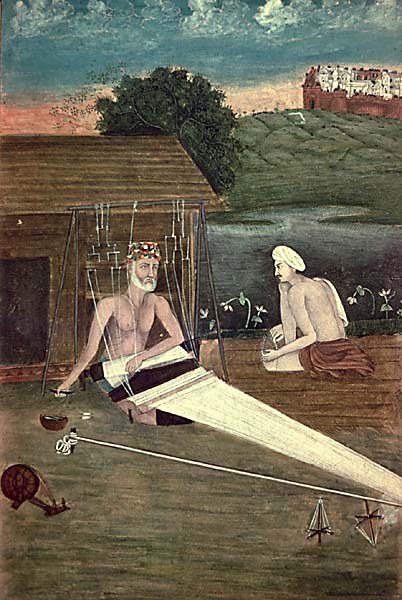 Kabir was a 15th century Indian master, another poet and mystic. He is practically unique in religious history, as his teaching brought together Hindus and Muslims, and at the same time is considered a saint to the Sikh religion. Why was he a rebel? Kabir was brought up in a Muslim family of weavers. But from a young age he began to study under a Hindu mystic as well. He ultimately preached a firm rejection of all partisan religions, pointless religious rituals, and priestly hypocrisy. He said "if Allah is in a mosque, then who does the rest of the world belong to? If Rama is in a statue, then who knows what is outside? Look inside your heart, and there you'll find both Allah and Rama"! What happened to him? Kabir was persecuted in his own lifetime, beaten by angry mobs, and put on trial by both Hindu and Muslim authorities. Even so, after his death both Muslim and Hindu mystics tried to claim him as their own, as well as the later Sikh religion.
Kabir was a 15th century Indian master, another poet and mystic. He is practically unique in religious history, as his teaching brought together Hindus and Muslims, and at the same time is considered a saint to the Sikh religion. Why was he a rebel? Kabir was brought up in a Muslim family of weavers. But from a young age he began to study under a Hindu mystic as well. He ultimately preached a firm rejection of all partisan religions, pointless religious rituals, and priestly hypocrisy. He said "if Allah is in a mosque, then who does the rest of the world belong to? If Rama is in a statue, then who knows what is outside? Look inside your heart, and there you'll find both Allah and Rama"! What happened to him? Kabir was persecuted in his own lifetime, beaten by angry mobs, and put on trial by both Hindu and Muslim authorities. Even so, after his death both Muslim and Hindu mystics tried to claim him as their own, as well as the later Sikh religion. -
10.
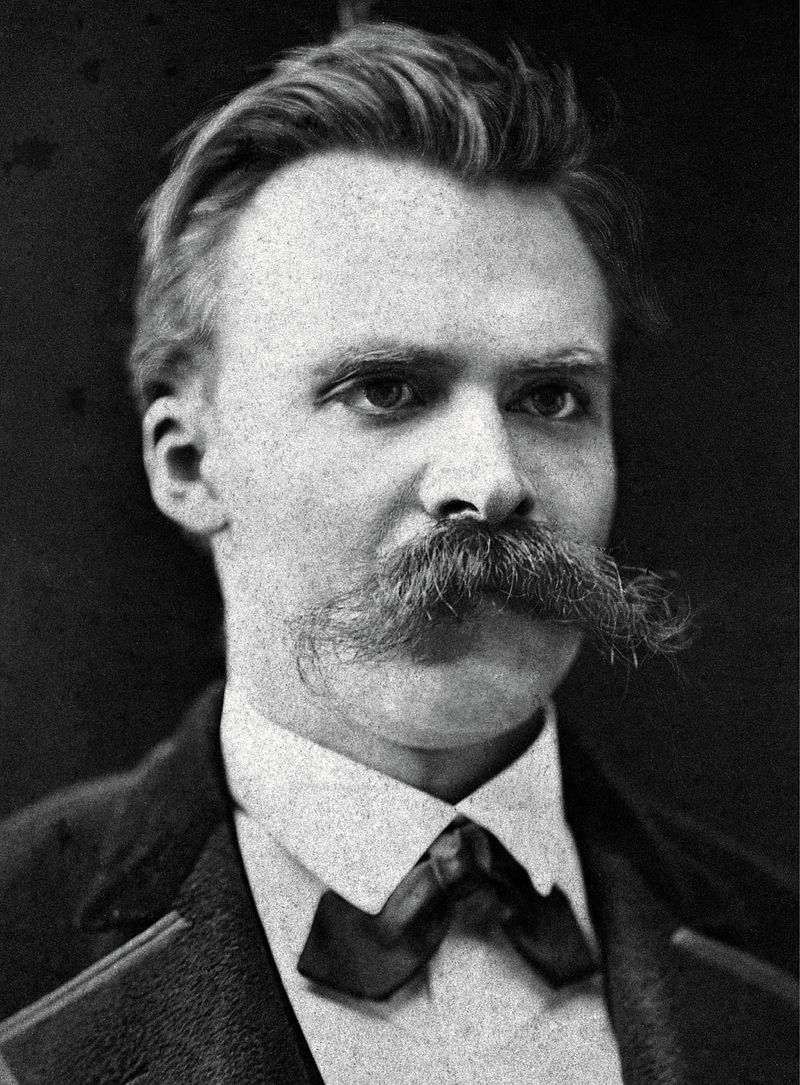 It might seem strange to include the guy who famously said "God is dead" in a list of crazy mystical rebels. But keep in mind that there's a lot of people on this list who also technically didn't believe in the kind of God that Nietzsche was calling dead. Friedrich Nietzsche was in many ways the last great mystic of the pre-modern world, and the first of the modern world. Why was he a rebel? Nietzsche understood a fundamental issue in human consciousness, which he explained in his most famous work, Thus Spake Zarathustra. This book is every bit as mystically deep and artistically elaborate as some of the trippiest Buddhist or Tantric scriptures or Sufi poems that some of the other guys on this list wrote. Like those, Nietzsche's book talks about self-transformation; and in it he realizes that the age of industrialization and reason created a situation where it wasn't just crazy mystics, but the population as a whole who could no longer settle for the easy-answers of mainstream religion. He predicted two responses to this: the "ultimate" (or last) man, who would distract themselves in seeking material comforts and trying to make their life as easy as possible; and the Super or Overman, who would strike out against convention and be willing to suffer or sacrifice anything for the sake of Truth. The freedom of the spirit and transformation of the self depends, he said, not on making your life as comfortable or as happy or as easy as possible; but on finding your "Will", your higher self's purpose, what you were meant to do, and to do this at any cost. Not to drug yourself with beliefs or with possessions or with literal drugs ("a little poison to sleep more comfortably, a larger poison to die more comfortably"), but to wake up and free yourself by becoming a conscious individual doing whatever your soul knows you must do. What happened to him? Nietzsche was misunderstood by almost everyone. The religious people thought he was just a god-hating atheist, and the atheists also thought he was just that too (both were wrong). The fascists thought he was talking about some idea of might make right, so did the left (again, both were wrong; Nietzsche would have been appalled at seeing his teaching of total individualism being co-opted as a tool for herd mentality, and then condemned by another group of collectivists). In the end, Nietzsche suffered from a mental breakdown (possibly caused by a brain tumor) and died. Meanwhile, his warnings about the 'ultimate man' have become more relevant to the West than ever.
It might seem strange to include the guy who famously said "God is dead" in a list of crazy mystical rebels. But keep in mind that there's a lot of people on this list who also technically didn't believe in the kind of God that Nietzsche was calling dead. Friedrich Nietzsche was in many ways the last great mystic of the pre-modern world, and the first of the modern world. Why was he a rebel? Nietzsche understood a fundamental issue in human consciousness, which he explained in his most famous work, Thus Spake Zarathustra. This book is every bit as mystically deep and artistically elaborate as some of the trippiest Buddhist or Tantric scriptures or Sufi poems that some of the other guys on this list wrote. Like those, Nietzsche's book talks about self-transformation; and in it he realizes that the age of industrialization and reason created a situation where it wasn't just crazy mystics, but the population as a whole who could no longer settle for the easy-answers of mainstream religion. He predicted two responses to this: the "ultimate" (or last) man, who would distract themselves in seeking material comforts and trying to make their life as easy as possible; and the Super or Overman, who would strike out against convention and be willing to suffer or sacrifice anything for the sake of Truth. The freedom of the spirit and transformation of the self depends, he said, not on making your life as comfortable or as happy or as easy as possible; but on finding your "Will", your higher self's purpose, what you were meant to do, and to do this at any cost. Not to drug yourself with beliefs or with possessions or with literal drugs ("a little poison to sleep more comfortably, a larger poison to die more comfortably"), but to wake up and free yourself by becoming a conscious individual doing whatever your soul knows you must do. What happened to him? Nietzsche was misunderstood by almost everyone. The religious people thought he was just a god-hating atheist, and the atheists also thought he was just that too (both were wrong). The fascists thought he was talking about some idea of might make right, so did the left (again, both were wrong; Nietzsche would have been appalled at seeing his teaching of total individualism being co-opted as a tool for herd mentality, and then condemned by another group of collectivists). In the end, Nietzsche suffered from a mental breakdown (possibly caused by a brain tumor) and died. Meanwhile, his warnings about the 'ultimate man' have become more relevant to the West than ever.
- REPLAY GALLERY
-

- History's Craziest Mystical Rebels Who May Have Been On To Something
The great-granddaddy of all 'mystical rebels' was the Pharaoh Akhenaten. He was ruler of all Egypt in the 14th century BC. Why was he a rebel? He was the first guy in known history to claim that there was only one God. For Akhenaten, it was the Sun, which he called the Aten. And it wasn't even a god with a body (not even the animal-headed bodies the Egyptians liked); it was just "the sun". He shut down every other temple in Egypt, and during the couple of decades of his rule, Egypt was the first monotheistic state. What happened to him? His ideas were too radical for the Egyptian people, and highly unpopular. He was untouchable while he was alive, but as soon as he died all his reforms were reversed. Akhenaten's spiritual vision was wiped away. Or maybe not. Some archaeologists have noticed some similarities between the Aten religion and Judaism, which would appear a while later. In one very telling piece of evidence, Akhenaten's "Great Hymn To the Aten" bears a striking similarity to Psalm 104, which is recited daily by observant Jews. Some unorthodox historians think Judaism may have been influenced (or even descended from) faithful adherents of the Aten that were forced out of Egypt.
10/10
1/10
Categories:
Wtf


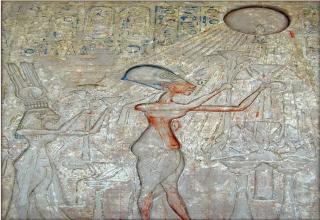






0 Comments